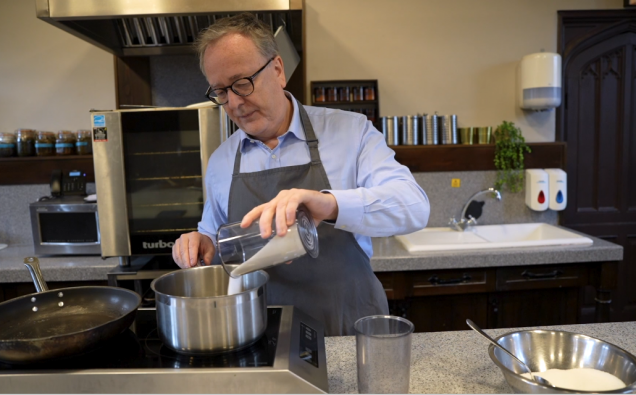Daniel Newman is an Arabic Studies professor at the University of Durham in the United Kingdom. He specialized in Middle Eastern and Arabic studies. His scholarly interests over the years have included Arabic travel literature, 19th-century Arab reform movements, Islamic medicine, and the culinary history of medieval Arabs. Among his publications are Muslim Women in Law and Society. An Imam in Paris; Account of a stay in France by an Egyptian cleric (1826-1831). He was the co-recipient of the World Award of the President of the Republic of Tunisia for Islamic Studies for the book entitled Muslim Women in Law and Society. His translation and edition of an Egyptian cooking book from the fifteenth century; The Sultan’s Feast (2020) was long listed for the Peter Mackenzie Smith Book Prize 2021 and received the Gourmand World Cookbook Award 2021. His most recent book is The Exile’s Cookbook: Medieval Gastronomic Treasures from al-Andalus and North Africa is a translation of a thirteenth-century Andalusian cookery book. His research was included in a six-part Aljazeera series on the history of medieval Arab cuisine. He maintain a Blog (http://eatlikeasultan.com/) and Instagram account (medieval_arab_cooking) where he shares his passion of inventing recipes to authentically recreate medieval Arab cuisine.
Q.) What inspired you to study medieval Arabic cooking and write books about it?
Professor Daniel: It developed from my interest in Islamic medicine, which emphasizes the importance of food, and my studies on aphrodisiacs (The Sultan’s Sex Potions, 2014). Of course, it’s also a really fascinating topic! Lastly, I would describe myself as a lifelong “foodie” who has always held the view that food can tell us a lot about people and their cultures.
Q.) What intriguing aspect of cuisine in the era of medieval times do you find appealing?
Professor Daniel: So many of them! The thing that probably always astounds me is how they are able to create extremely complicated dishes that are even difficult to prepare with today’s technology. Additionally, they placed a great deal of importance on presentation, as was humour; An instance that mixes the two is when they created dishes like “eggless omelets,” using chickpeas to make an impressive dish that would deceive and impress the diner.
Q.) Do you think there are still undiscovered cookery books from the period?
Professor Daniel: Certainly. Actually, I had the good fortune to come upon a cookbook compilation. The manuscript is really intriguing because it distinctly depicts a cuisine from the eighth or ninth century, which is the earliest time. I am currently working on the edition and English translation of the text, which will be published in the near future.
Q.) What distinctions did you see between cooking in the medieval era and the present era?
Professor Daniel: It’s a mixed picture to be honest. On the one hand, there are quite a few things that have survived from the Middle Ages, such as Qatayef (stuffed crepes), Muhallabiyya (a kind of pudding), Mulukhiyya, Couscous, Zalabiyya (fritters) and Msemmen (Moroccan bread) – to name but a few. In other cases, the dish has the same name but with different ingredients or preparation: for instance, the medieval pomegranate stew – usually made with chicken — known as Rummaniyya (the ancestor of the modern Persian Fesenjān) is today made with vegetables, lentils particularly. On the other side, it is unfortunate that many of the period’s iconic meals have vanished, particularly the many stews that they enjoyed at the time. The most notable distinction is the absence of ingredients associated with the so-called ‘Columbian exchange’, such as potatoes, tomatoes, chilies, and so on. However, the cuisine was so varied and interesting that you won’t miss them, I assure you!
Q.) Is it hard to make Arabic foods from medieval times? How would you go about it?
Professor Daniel: The most challenging aspect is that the majorities of the recipes lack exact measurements or even mention how many people they are intended for! As a result, a lot of trial and error is involved. However, it becomes simpler with time—I’ve been recreating hundreds of dishes for almost fifteen years.
Q.) How do you feel about winning so many accolades?
Professor Daniel: It makes me feel humbled and proud, but most all, I want to do my small share to spread awareness of this amazing culinary legacy.
Q.) What obstacles did you have to overcome in order to gather information for your study on medieval cooking?
Professor Daniel: In addition to the previously noted problems with the recipes’ lack of measures, several of the sources are only available in manuscript form, which is not always convenient.
Q.) Which Arabic dish—Medieval or Modern—do you prefer?
Professor Daniel: This is a fascinating question that I am asked quite often, as you can probably understand! My all-time favorite dish from the medieval age would be Judhaba, which is essentially a drip pudding made with roasted chicken served over cake. My ideal dessert would be Qahiriyya, or marzipan doughnuts, which have been a favorite treat in many regions for ages due to their deliciousness. The Moroccan lamb and prune tajine is definitely my choice if I had to pick one from the present era.
Q.) Do you believe that the foundation of modern cooking was laid by medieval cooking?
Professor Daniel: I’d rather think of it in terms of how much we can learn from medieval cooking today. For instance, the use of fresh ingredients, the fact that they did not let anything go to waste – it was a very sustainable way of approaching food. Something I believe we can learn a lot from.
By: Rida Khan ( Aviation Author)
Instagram A/c: aviationauthor.ridakhan


















